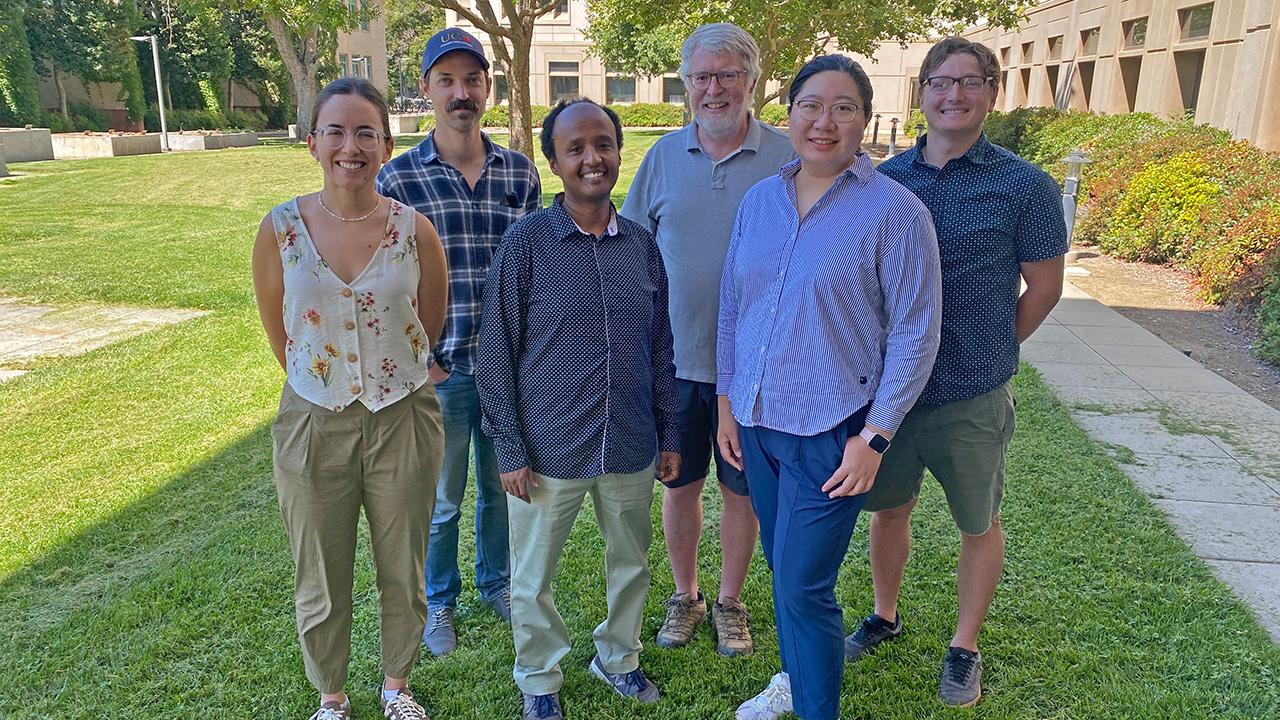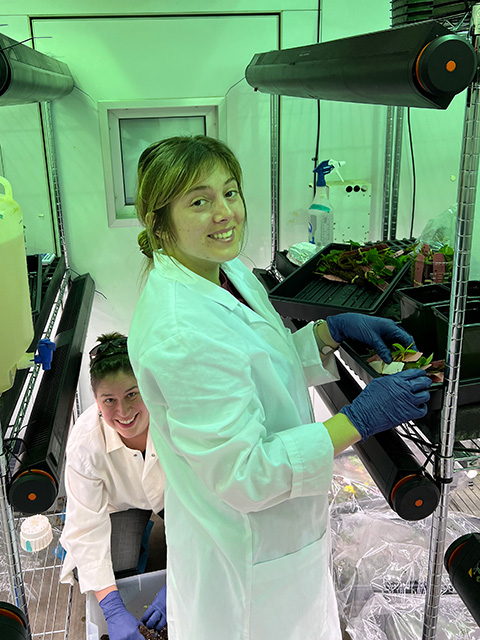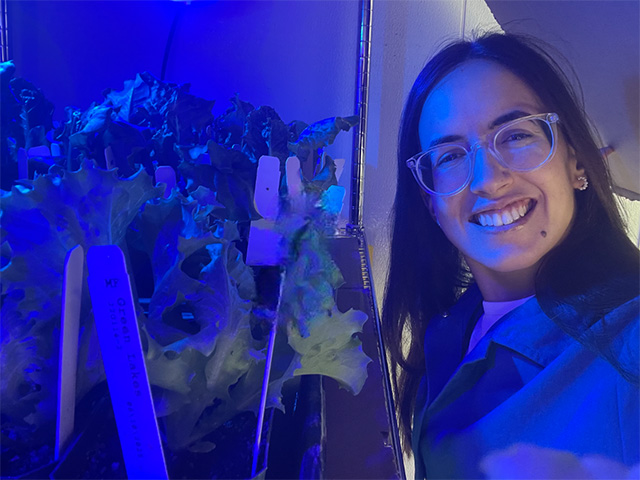
New plant breeding certificate deepens grad student skills
First cohort recognized this year

The first cohort of students in a new plant breeding program have earned their certification. The specialized program aims to give graduate students a deeper dive into specialty areas that will enhance their ability to land jobs in plant breeding.
The graduate academic unit certificate in plant breeding has been in the planning stages for three years in the Department of Plant Sciences. The certificate program is chaired by Charlie Brummer, a professor in the department and director of the UC Davis Center for Plant Breeding.
”Because UC Davis doesn’t have a specific degree in plant breeding, this certificate enables students from any graduate group to document that they have taken a core set of courses that provide the necessary background for a plant breeding career,” Brummer explained. “The certificate clarifies to employers that, even though the student’s degree is not ‘plant breeding,’ they have the background needed for those jobs.”
Working with Brummer are program executive committee members Mitchell Feldmann, an assistant professor and head of the UC Davis Strawberry Breeding Program, and Patrick J. Brown, an associate professor and nut crops breeder; both in the Department of Plant Sciences.
The first cohort of students earned their certificates this spring. Students are Caitlin Tayler Bailey, Paul Skillin, María Ferrer Ruiz, Yufei Qian, Ali Said Yusuf and Jonathan Berlingeri. All are in the horticulture and agronomy graduate group, housed in the Department of Plant Sciences.
To earn the GAUC in plant breeding, students take four courses totaling 16 units as part of their graduate work. The courses focus on genetics, genomics, designing experiments and using advanced breeding tools. Their goal is to breed crops with traits that better meet the needs of growers, processors, marketers and consumers amid environmental challenges. The certificate is noted on each student’s transcript, Brummer added.
The program formalizes skills and experience students have gained through coursework and research at UC Davis, participants said.
“I am extremely fortunate to be at UC Davis, where plant science is enriched by interdisciplinary innovation and world-class training,” Berlingeri said of the experience.

We asked our first group of certificate-holders to tell us more about their research and plans for the future.
Paul Skillin: Tools to feed a growing population
Skillin is a doctoral student in the UC Davis Strawberry Breeding Program. He works with Mitchell Feldmann, director of the strawberry program, and his research seeks the causes of fruit rot in strawberries.
“From being part of a plant breeding lab to each of the specialized courses I’ve taken, this certificate summarizes my work and passion for developing new and better crops for farmers and consumers,” Skillin wrote.
“More importantly, this certification signals the collective commitment to providing tools to grow food for a growing population facing climate challenges,” Skillin added.
María Ferrer Ruiz: Disease-resistant lettuce
María Ferrer Ruiz is a Ph.D. candidate in the lab of Richard Michelmore, a distinguished professor in the department and founding director of the UC Davis Genome Center. Ferrer Ruiz seeks the molecular mechanisms that enable lettuce plants to resist two soilborne diseases: corky root and Verticillium dahliae, a fungus that causes the plant to wilt. These diseases reduce lettuce yields in the United States and around the world.
Using a range of genetic and genomic tools, Ferrer Ruiz investigates genes related to resistance and how they can be used in breeding programs to develop resilient crops. She couples that work with a decade of hands-on experience, including in plant pathology. “I’m excited to apply this foundation to address growers’ needs,” she wrote.

Now close to finishing her studies, Ferrer Ruiz sees the plant breeding certificate as a meaningful recognition of her training. “It strengthens my profile as I enter the job market and reinforces the knowledge I’ve gained throughout my graduate studies,” she said.
Yufei Qian: Controlled environment agriculture

Qian is a Ph.D. candidate working in controlled environment agriculture in the lab of Gail Taylor. Much of her work has involved growing the superfood watercress in indoor facilities.
But, CEA techniques can be applied to breeding a broad array of major and minor crops. For example, Qian said, she can adjust greenhouse conditions to speed up flowering and seed set, which speeds up the breeding process, or to increase the nutrients in plants. Such techniques can then be combined with conventional field trials.
“I am deeply grateful to everyone in the department who made the GAUC in plant breeding possible. This certification affirms an important additional sequence of skill sets and specialized knowledge in plant breeding for graduate students,” Qian wrote.
“It is a meaningful step in my academic journey, and I hope it will open up new opportunities in my future career."
Ali Said Yusuf: Chickpeas for acid soils
Yusuf is a Ph.D. candidate working with Douglas Cook, a professor in the Department of Plant Pathology. He works at the intersection of plant genetics, genomics and breeding, with the goal of fighting hunger around the world.
Yusuf has worked with squash, tomatoes and wheat, but his current research focuses on breeding chickpeas – also known as garbanzos – that tolerate aluminum in the soil. Most varieties of cultivated chickpeas are vulnerable to mineral aluminum in soils that also are acidic: The element dissolves in water, stunts roots and reduces crop yield. But, wild varieties that tolerate aluminum can be crossed with domesticated chickpeas to create plants that can thrive in problematic soils. That would expand the range where people could grow this tasty legume rich in protein, minerals and fiber.
He called the training offered through the certificate program “rigorous,” strengthening his foundation in classical and modern breeding techniques. “The program’s emphasis on quantitative genetics, molecular breeding and data analysis has improved my ability to contribute to research and development in academia or in the seed industry,” Yusuf added. “It makes me a more competitive candidate for plant breeding roles in both public and private sectors.”

Jonathan Berlingeri: Collaboration for better nutrition
Berlingeri is a doctoral student working with Christine Diepenbrock, an assistant professor in the department. He seeks more nutritious crops to improve people’s health. That has led him to working with robotic systems for sensing plant traits. He then uses the data he collects to gain insights into breeding lettuce and legumes with both higher nutritional value and tolerance to stress. The experience, he wrote, “has brought me into collaboration with engineers, breeders and crop modelers, among others…
“I’m especially proud to be among the first recipients of the graduate academic unit certificate in plant breeding,” Berlingeri added. “Earning this distinction affirms that I am well-prepared to contribute to developing crops that meet the evolving needs of communities in California and beyond, today and in the face of tomorrow’s environmental challenges.”

Related links
Learn more about the graduate academic unit certificate in plant breeding here.
Learn about other graduate academic unit certificate programs offered through UC Davis Graduate Studies here.
Media Resources
- Trina Kleist, UC Davis Department of Plant Sciences, tkleist@ucdavis.edu, (530) 754-6148 or (530) 601-6846.
